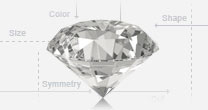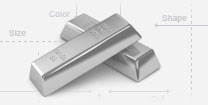- Diamonds
- Engagement
- Jewelry
- Education
- Learn about Diamonds
- Learn about Metals
- What to expect when buying a ring
- Custom Design Process
- The Diamond 4 C's
- How To Care For Your Jewelry
- How To Plan A Wedding
- Picking an Engagement Ring
- Top 10 Ways To Propose
- The Meaning Behind Shapes and Colors of Diamonds
- Advice for Grooms
- The Natural History, Mythology, and Symbolism of Popular Gemstones
- The Bridal Style Checklist
- The Economics of Engagement Rings
- How to Keep Your Diamonds Safe from Theft or Damage
- How to Create the Perfect Christmas Proposal
- The Secret Guide for Authentic Engagement Photos
- How to Plan the Perfect Marriage Proposal
- Best Seasons to Get Married In
- About Us
The 4 C's - Clarity, Color, Cut, Carat
The 4 Cs (Clarity, Color, Cut and Carat Weight) are the main attributes by which the diamond industry evaluates diamond quality. It is of paramount importance to understand this basic terminology, as it is the reflects the terms by which diamondaires rate diamonds comparatively, and the way in which diamonds are evaluated and certified by the independent laboratories that issue Diamond Grading Reports. Understanding the 4 Cs will enable you to grasp the details that are listed in your diamond's Grading Report, and give you the 4 most important words in the vocabulary of the diamond industry.
-

Clarity
Clarity refers to the existence of internal and external imperfections that characterize an individual diamond. A diamond's clarity determines value, along with the other 4 Cs of Carat Weight , Cut , and Color. You may also hear clarity referred to as "purity" or "quality" in the diamond trade. Diamonds with perfect clarity are very rare, as most diamonds will have microscopic inclusions or blemishes.
-

Color
Most diamonds have hints of color, and subtle color differences have a big impact on diamond prices. Diamonds are actually found in many colors, but the majority of diamonds available will have tints of yellow or brown. Diamond color is a primary quality factor along with the other 4Cs.
-

Cut
Cut refers to the proportions and relative angles of a faceted diamond. A diamond's cut should not be confused with its shape. Out of the 4Cs, diamond cut has the biggest impact on sparkle, brilliance and fire . A diamond's cut quality is a fine balance of proportions and angles, and most diamonds in the marketplace are average cuts. A well-cut diamond will sparkle more and will be livelier than a diamond that is poorly cut. When you are evaluating the 4Cs, understand that Cut trumps the others by turning a pebble of a diamond into a sparkling gem.
-

Carat Weight
Carat Weight is the simplest and only truly objective factor of the 4C's. Carat weight is not directly correlated to the size of a diamond since different diamonds can distribute the weight differently depending on how they are cut and what shape they are. One carat equals 200 milligrams and a hundreth of a carat is referred to as a "point". Larger diamonds are rarer than smaller diamonds and are exponentially more expensive than their smaller counterparts. An example of this can be seen with the prices of 2 Ct. diamonds being more than double the price of a 1 Ct. diamond of the same quality.










